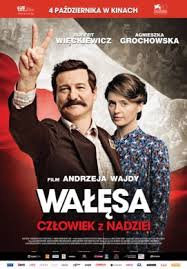
WALESA – MAN OF HOPE
Poland, 2013, 128 minutes, Colour.
Directed by Andrej Wajda.
There was a time, from the early 1980s and through that decade, that most people knew who Lech Walesa was and how the Solidarity Movement in Poland, starting on the waterfront of Gdansk, led to the downfall of the Polish government and offered an example to other Soviet countries of how, especially after the death of the Russian President, Leonid Brezhnev, the Soviet Union could never be the same. Then, in 1989, the Berlin Wall came down.
At the time, celebrated Polish director, Andrez Wajda, made a number of films that reflected the situations of the late 1970s, early 1980s. One of them was a fiction/semi-documentary, Man of Iron (1981), about Solidarity and how it was beginning its move against the government presiding over a failing Polish economy. It was also a society plagued by officialdom, bureaucracy, secret police and oppression of civil rights.
Wajda was in his mid-80s when he made this portrait of Walesa, his opportunity to go back to this period, not just to show it as it was, but with the benefit of 30 years of hindsight and almost a quarter of a century of freedoms. From this film, it is clear how admiring he is of Walesa of Solidarity and the changes in Poland.
Walesa is shown at the opening of the film being interviewed by famous Italian journalist, Oriana Fallaci. As the film keeps going back to the interview, it offers the screenplay the chance to ask significant questions as well as to show Walesa’s character. He would not have been an easy man to deal with, sometimes a stolid waterfront worker and union man, not a smiling man. Rather, he is determined, strong-minded, prepared to be jailed many times, to keep to his principles. We see him at home with his long-suffering and loving wife. We see him in discussions with the workers. We see him at demonstrations. We are told of his charisma – which does quite come across. Perhaps the English sub-titles do not do justice to his charisma.
Nevertheless, the film is of interest to find the Polish point of view on Walesa. Involved in disputes and strikes during the 1970s (and sacked from his job), he survives with mechanic’s work but finds that the 1980s are bringing to the surface the earlier uprisings of the 1970s. Authorities are exasperated by him and are out to get him. He is put to disadvantage personally and politically during the strikes and the consequent hardships of unemployment, loss of wages, hunger and the failing economy.
All the time there is the interest of John Paul II, elected in 1978, seen re-visiting Poland and supporting the goals of Solidarity. And his picture is on the wall of the Walesa household.
Ultimately, Solidarity prevails and we see footage of Walesa and his speech to the United Nations in 1989. He will soon become the President of Poland.
1. A Polish film, Polish history, Polish sensibility, the spirit of Poland?
2. The work of the director, many decades, his celebrated status in Poland? His films about communism and the collapse of communism?
3. Lech Walesa, in the 1970s and the 1980s, his leadership of the unions, of Solidarity, his ultimately becoming President of Poland? Nobel Prize?
4. Audience knowledge of Walesa, appreciation of him?
5. Polish history, the communist period, the emergence of the unions, of Solidarity, the fall of communism? Post-communist Poland?
6. The locations, the Polish atmosphere, the city of Gdansk, homes, the docks, offices? Workplaces? Government offices?
7. The film as a biopic, the opening interview, Oriana Fallacci, her status, the decision to come to Poland? The occasion for flashbacks, the cumulative effect? Seeing Walesa’s potential, his achievement?
8. Oriana Fallacci, her Italian background, her reputation, getting permissions? Walesa and his attitude? The tone of the interview? The effect of the flashbacks?
9. Lech Walesa, the film’s impression of him, as a man, his background, Polish, labour, his wife and children and his devotion, his Catholicism, home life, hard life, as an electrician, working on the docks, working with the men, the conditions, the unions? His stances? Election to leadership? The difficulties? The establishing of Solidarity? Political issues, his persecution, security, documents?
10. Work on the docks, the death of the young men and the effect?
11. Walesa, being followed, security concerns, the many arrests, imprisonments, the documents, his being fired?
12. 1980, the strike, his being consulted, the advice, entering into the strike, leadership, the harsh treatment? The role of the Polish President government? Imposing martial law? The consequences?
13. The role of the media, coming to the house, the meetings, Walesa and his caution – and sitting at home with his family watching Rich Man, Poor Man?
14. The tactics with Walesa, the imprisoned, the interrogations, the confinement, the releases?
15. His being awarded the Nobel prize, his wife going to accept it, her return, the humiliation of the strip search at the airport?
16. 1989, the elections, the fall of communism?
17. The role of John Paul II and Walesa’s contact with him, friendship?
18. Walesa becoming President of Poland, the surprise of his success? His achievement?